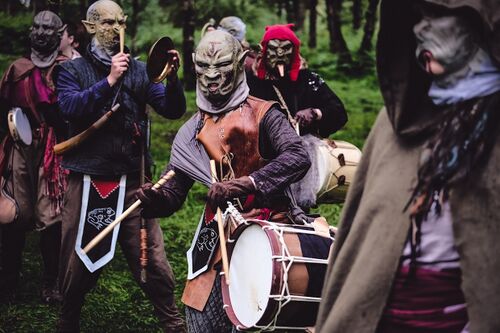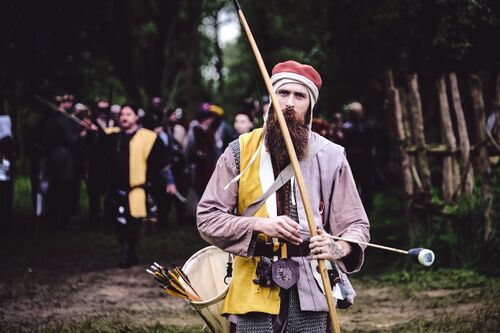Standards
mNo edit summary |
|||
| Line 33: | Line 33: | ||
==Game Information== | ==Game Information== | ||
The Jotun have conquered three-fifths of Southmoor, including the market town of Sarcombe. This means that following the Summer Solstice the [[Master of Sarcombe Metal Market]] will be unable to use [[Master_of_Sarcombe_Metal_Market#Mournful_Hills|their ministry]]. Likewise the [[Bailiff of the Downs]] has been forced to abandon their offices, meaning that in the coming season they will be unable to claim their [[Bailiff_of_the_Downs#Regular_Income|regular income]]. There'll also be nowhere to organise the protection of the Marcher orcs and less-well-protected farms from bandits, but that seems like the least of anyone's problems right now. The Empire has also lost access to the [[Think_of_the_children#The_Sarcombe_Register|Sarcombe Register]], but it's doubtful the Jotun will make an effort to harm the records – they are not the [[Druj]] after all. | The Jotun have conquered three-fifths of Southmoor, including the market town of Sarcombe. This means that following the Summer Solstice the [[Master of Sarcombe Metal Market]] will be unable to use [[Master_of_Sarcombe_Metal_Market#Mournful_Hills|their ministry]]. Likewise, the [[Bailiff of the Downs]] has been forced to abandon their offices, meaning that in the coming season they will be unable to claim their [[Bailiff_of_the_Downs#Regular_Income|regular income]]. The [[Town Clerk of Sarcombe]] will not be able to draw on their [[Town_Clerk_of_Sarcombe#Market_Fees|market fees]] until the Empire reclaims the market-town. There'll also be nowhere to organise the protection of the Marcher orcs and less-well-protected farms from bandits, but that seems like the least of anyone's problems right now. The Empire has also lost access to the [[Think_of_the_children#The_Sarcombe_Register|Sarcombe Register]], but it's doubtful the Jotun will make an effort to harm the records – they are not the [[Druj]] after all. | ||
With enemies in the Mourn, the people anticipate the imminent return of the Tusks to protect the territory, following the oath sworn by their general last season. If the army is not in the Mournwold by the start of the Autumn Equinox, leading a counter-attack or defending the people, the newly-established trust between the folk of the Mourn and the army [[I_already_know_you#Reeds,_Drakes,_Tusks,_Bounders|will be broken]]. | With enemies in the Mourn, the people anticipate the imminent return of the Tusks to protect the territory, following the oath sworn by their general last season. If the army is not in the Mournwold by the start of the Autumn Equinox, leading a counter-attack or defending the people, the newly-established trust between the folk of the Mourn and the army [[I_already_know_you#Reeds,_Drakes,_Tusks,_Bounders|will be broken]]. | ||
Finally, following the Summer Solstice, '''Hob Cullach''' will be unable to operate the Old Oak Inn, and their income will be reduced by 72 rings until Sarcombe is recovered (assuming their Inn survives any fighting in Sarcombe). | Finally, following the Summer Solstice, '''Hob Cullach''' will be unable to operate the Old Oak Inn, and their income will be reduced by 72 rings until Sarcombe is recovered (assuming their Inn survives any fighting in Sarcombe). | ||
Revision as of 19:07, 13 July 2024
The Lion and the Tower
Barely two weeks after the Spring Equinox, as Jotun armies march into Braydon's Jasse and into Bregasand, two more armies leave Liathaven and begin the conquest of Southmoor. The Lion of the North are the most versatile of the Jotun armies. When the Queen of Kallsea, Yrsa Jansdottir, sends out the call, the warbands and champions across the Jotun jarldoms answer, bringing their unique capabilities to bear. This season Queen Yrsa's army is bolstered by siege engineers from distant Tromsa, sent by Jarl Oglafsdottir to aid her monarch in the far south. The barbarians know there are castles in Mournwold, and that if they wish to claim the territory they will need to deal with them.
The Lion is supported by warriors who fight beneath the banner of Jarl Haakon, the former ruler of the Mournwold. They make good use of the hidden caches he and his warband established in the region a year ago, allowing them to speedily capture farms and households without needing to worry about supply lines. The traitor yegarra are also here; those who follow the lead of Stephen of Sarcombe. His hatred for the Empire has only grown since the death of his partner at the hands of Imperial heroes. Many of those who fight with him grew up in the Mourn under Jotun occupation, but the keen eyed spot a few blue banners with silver eels on them. With their ambitions in Bregasland shattered, it seems at least some of the Fisher household have found a new leader to fight for.
We march south to repay our debt, to offer aid to the people of the south as they bring war to the Marches. Let cunning Raðljóst guide the war-builders of Tromsa as they prepare to bring down the walls of the Marcher castles, and let Ulfur's horn sound the moment of the sure strike that ushers in victory. To war! To battle! To the ruin of our foes!
Queen Yrsa Jansdottir, Jarl of Jarls, Monarch of Kalsea, General of the Lion of the NorthWe march south to test our hammers against the shields of the Marches. We march south to aid our cousin Haakon in their conquest. We march south, to the hills of the Mourn and the Singing Caves.
Derun Stonetower, General of the Tower of the NorthThe Kalsean Jarl of Jarls does not come alone; the Tower of the North marches with her. In stark contrast to the usually loud and boisterous armies of the Jotun, the Tower are grim-faced, quiet warriors, veterans of a dozen campaigns or more. Among their number are some of the finest siege engineers in a nation famed for its prowess with stone and iron.
The western half of Southmoor falls quickly. Those who refuse to flee their farms face the Choice, one the older folk know well. The Jotun make no distinction between human and orc – they seem indifferent to the fact that a number of Mournwold orcs are now Marchers. They are treated just like their human neighbours – given the Choice and when they refuse to be Jotun, they become thralls once again. The anger at being so casually reduced in status once more ignites fury in some of the orcs, who make a Choice of their own and take up weapons and fight alongside their yeomen countryfolk. Most of them die, but a few escape east to Sarcombe with their fellow Marchers.
While the orcs offer the Choice, there are rumours that some of the yegarra of Stephen's warband are less keen to do so, choosing to keep fighting even when their foes have laid down their weapons. There is a rumour that Jarl Haakon and Stephen clash over this, with the orc leader condemning the dishonourable actions of the yegarra. The Queen herself is forced to intercede, according to a few straggling beaters who reach Sarcombe ahead of the Jotun forces. They say that Yrsa makes Stephen choose between swearing an oath to uphold the honour of the Jotun and being cast out of her army and forced to return to Liathaven. The idea that there is conflict among their enemies gives some scant comfort to the Marcher defenders.
Sarcombe
Inevitably, as they push west the Jotun come to Sarcombe. It seems there is some surprise that they do not face steeper resistance, that there is no fortification here. When the Jotun ruled the Mourn, they built the castle of Hillstop above Sarcombe to keep an eye both on the rolling downs and on the forests of Liathaven. The invaders apparently assumed the Empire would have rebuilt it – and seem almost taken aback when they discover the only fortification standing between them and conquest of Southmoor are the walls of a market town.
Even in the absence of armies, the Mourn is not without its defenders, however, and they rally to Sarcombe as soon as beaters bring word of an orc force moving east out of Liaven's Glen. As they march west into Southmoor, the ranks of those soldiers stationed at Landskeeper's Bulwark and Farstrider's Watch are further swollen by the yeomen of the Wold, by orc healers and scouts, and by a handful of Highborn priests, magisters, and soldiers here in the spirit of peerless kinship.
While the orcs quickly capture households and farms in the west of the region, they meet stiff resistance at Sarcombe itself. Nearly ten thousand orcs against a garrison of little more than six thousand Marchers and Highborn allies.
As the two Jotun armies gather, a Jotun warrior arrogantly strides out to stand before the walls of Sarcombe, sounding his warhorn three times to make sure all eyes are on him. This is Jarl Haakon, who once ruled over the entire Mourn. He offers the garrison the chance to withdraw, or to take the Choice and join the Jotun. He is met with jeers and whistles, and a barrage of rotten vegetables (not that any of them strike home; he stands well out of range of any missile).
Jarl Haakon doesn't respond to the Marchers' defiance, turns on his heel and strides back to the battle-lines, swallowed up by the sea of orcs as he rejoins his warband. Minutes later the horns sound again, and the Jotun attack.
The siege engines the Jotun have brought with them, intended to take down the walls of the 'Bulwark or the 'Watch make short work of the Sarcombe gates. A flood of warriors spills through, eager to engage the defenders hand-to-hand. Siege ladders slap against the low walls of the market town, eager orcs pouring up to bring battle to the yeomen garrisoning the ramparts. The warhorns sound again and again, brazen thunder as the Jotun armies push the defenders back.
Desperate fighting ensues in the streets of Sarcombe, but it is Imperial soldiers that are forced to withdraw. Some of the folk of Southmoor go with them, a fighting retreat back toward the Greensward and the Ore Hills. Others remain behind, refusing to admit defeat before the Jotun. A few die fighting, the rest are faced with the Choice again.
As the Imperial garrisons retreat, a beacon blossoms on the hill above Southmoor where Hillstop once stood. The standard of Jarl Haakon and that of the Queen of Kalsea flutters over the Old Oak Inn.
The Jotun have returned to the Mourn.
Game Information
The Jotun have conquered three-fifths of Southmoor, including the market town of Sarcombe. This means that following the Summer Solstice the Master of Sarcombe Metal Market will be unable to use their ministry. Likewise, the Bailiff of the Downs has been forced to abandon their offices, meaning that in the coming season they will be unable to claim their regular income. The Town Clerk of Sarcombe will not be able to draw on their market fees until the Empire reclaims the market-town. There'll also be nowhere to organise the protection of the Marcher orcs and less-well-protected farms from bandits, but that seems like the least of anyone's problems right now. The Empire has also lost access to the Sarcombe Register, but it's doubtful the Jotun will make an effort to harm the records – they are not the Druj after all.
With enemies in the Mourn, the people anticipate the imminent return of the Tusks to protect the territory, following the oath sworn by their general last season. If the army is not in the Mournwold by the start of the Autumn Equinox, leading a counter-attack or defending the people, the newly-established trust between the folk of the Mourn and the army will be broken.
Finally, following the Summer Solstice, Hob Cullach will be unable to operate the Old Oak Inn, and their income will be reduced by 72 rings until Sarcombe is recovered (assuming their Inn survives any fighting in Sarcombe).

